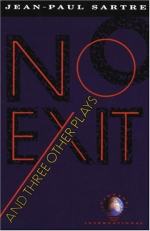|
This section contains 489 words (approx. 2 pages at 400 words per page) |

|
World War II engulfed Europe beginning in 1939. Nazi leader Adolf Hitler took power in Germany and embarked on an aggressive military campaign as early as 1936. He began annexing European states by 1938. France declared war on Germany in 1939, and Hitler invaded and conquered France by 1940. The war in Europe ended in the spring of 1945, and Paris was finally liberated.
Daily life was difficult in France during World War II. A large part of France was occupied by Nazi Germany, including Paris, where Sartre lived. Because France was an occupied country, life, in many ways, was at a standstill. In Sartre's hell, too, life was very static. France's occupation also led to shortages of everything, including heat and electricity. Sartre makes an ironic comment on this situation by having an overabundance of heat and light available in hell. German censors controlled the plays performed in...
|
This section contains 489 words (approx. 2 pages at 400 words per page) |

|




